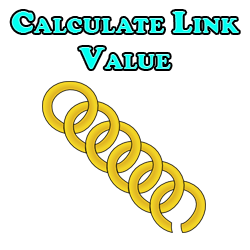Link value isn’t a black and white science, there are many different values of weight which search engines place on links for a lot of factors which you may not have even considered or thought of. Here are 8 of the major factors which search engines use to calculate and assign link value.
Calculate Link Value
Link Position on Page
Links closer to the top of a page are deemed as being more valuable as links which are further down on a page. So if I’m writing this post right now and I include a link in the first couple of paragraphs, that link will give more link juice to a page than if I included a link to that same page but in the 6th or 7th paragraph.
Link position is so important that even if a link which is lower on a page is better optimized than a link which is higher on a page, the higher link will generally still hold more link value even though it’s less optimized.
Links in Text Hold More Link Value Than Those in Menus
The position point I just made gets challenged by the second point. Links in the menus pass less link value than links in the body/content of a page, even if they appear above the links in the body/content of a post.
Higher Authority Domains Pass More Link Value
This one is obvious; a link from an authority and trustworthy domain like CNN.com will outrank a link from a lesser site. Links from deep within the architecture of a site like CNN will even outrank a top level link from a lesser domain, as well.
Links in Text Outrank Links in Image Alt Attributes
In Google image ranking, I covered how to get your images to rank in Google. You can obviously also add in a link to your image’s attributes rather than just giving it a keyword to go with it, but if you point an image and text link (2 links) to a page on another domain, the text will pass more link value in the eyes of the search engines.
External Links Are More Valuable Than Internal Links
Another obvious one, but an external link to a site holds more link value than an internal link from that site to itself. This makes sense because it’s easy to link to your own site from your site, but when someone else links to your site from theirs, that’s seen as another webmaster giving your website a virtual thumbs up and approval of your content which the search engines take into consideration. See this post on internal links and external links for more information.
Domain Diversity is Good
This one is in the same vein as the last point. Getting a 10 links from one webmaster is good, but getting one link a piece from 10 different webmasters is worth a great deal more because that’s 10 different people giving you a thumbs up versus one person doing it 10 times. Search engines identify the IP address of every link which gets sent to your site to identify if they’re coming from the same place or different locations.
Other Sites Which a Site Links to Affect It’s Link Value to You
If a site links to spammy sites as well as your site, the link value which you receive from it will be diminished. Conversely, if a site links to good content as well as your site, the link value will not be negatively affected.
Degrees of Separation Matter
In keeping with the idea that search engines positively love and reward popular/well trusted authority sites (like CNN.com as our example), search engines will place grant more link value to sites which have less degrees of link separation between themselves an an authority site. So if you get a link from a site which has itself received a link from CNN.com, your link will be worth more.
This makes sense though and is really just another way of saying that search engines like and reward authority/trustworthy/popular sites, because if a site receives a link from a high authority and well respected site like CNN.com, then that site will be seen as being higher authority than it was before.
This is the basis of link building and again reiterates the point that links are like getting virtual thumbs up from another webmaster; in this case it just happens that whomever exactly the webmaster giving the thumbs up is especially important in determining how much link value you’ll receive from that link.
